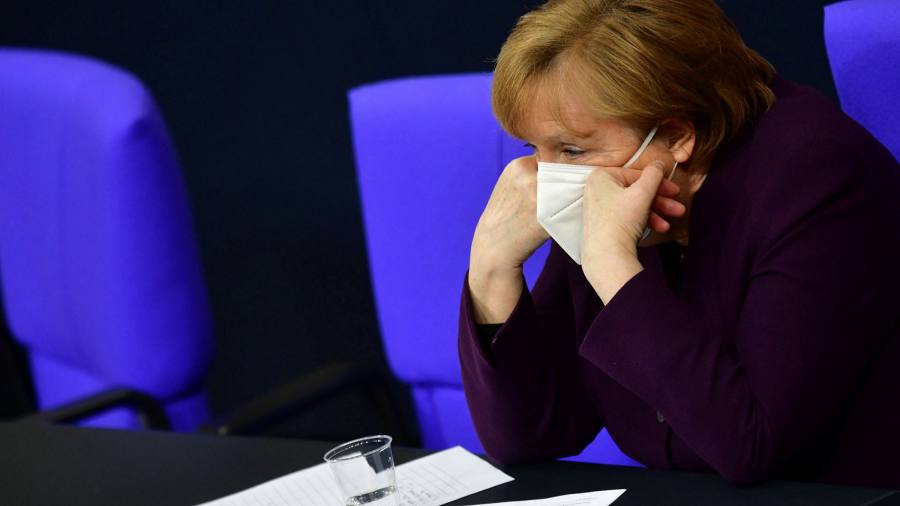[ad_1]
Entering a critical election year, and amid growing anger at European vaccine shortages, Germany’s Social Democrats are making a risky political play: they are turning against their own partner in government.
For 12 of the past 16 years, the SPD has been the junior member in a “grand coalition†with chancellor Angela Merkel’s Christian Democrats (CDU). Yet it has seen few of the benefits. Popular support for the government’s stewardship of the coronavirus pandemic has raised the CDU’s approval rating above 35 per cent, from below 30 per cent before the virus took hold. The SPD, meanwhile, has remained stuck at or around 15 per cent for the past year.
Now, however, it aims to capitalise on popular frustration with the EU’s botched procurement programme, and the rollout of jabs in Germany, which has been slow, even by European standards. The three politicians most exposed in the vaccine debate all belong to the CDU: Ms Merkel, health minister Jens Spahn and Ursula von der Leyen, president of the European Commission and a former German defence minister.
Earlier this month the SPD’s Olaf Scholz, finance minister, sent a list of pointed questions on vaccines to Mr Spahn. Michael Müller, Berlin’s SPD mayor, wrote a letter to Ms Merkel, demanding a vaccination plan that German news magazine Der Spiegel called “a declaration of warâ€. And the state premier of Mecklenburg-Vorpommern, Manuela Schwesig, ruffled CDU feathers in a television interview by saying “even the United States under [former President Donald] Trump†— highly unpopular in Germany — had “obviously done a better jobâ€.

“The party is desperately looking for a way to build its own profile,†said Uwe Jun, a political scientist at Trier University. “But the probability that this will backfire for them is higher than the chance of profiting from it.â€
For the SPD, this is a critical moment — a “super-election yearâ€, in which Germany holds Bundestag elections in September and a series of state government elections throughout the year. It faces its first serious contest in six weeks’ time, when it will fight to hold on to the premiership of Rhineland-Palatinate. Some party leaders argue that loyalty in government has yet to work in their favour.Â
“I’ve been for seven years with the SPD as part of the grand coalition, and for seven years we said we won’t get credit for being critics of our own government,†said Jens Zimmermann, an MP from the state of Hesse. “Yet for seven years, we’ve been in decline in the polls.â€


Once one of the most influential parties of the centre-left in Europe, the SPD had its worst election results ever in 2018, receiving only 20.5 of the vote. Ever since, it has struggled to chart a new course. On the right, it is stuck beneath the CDU’s long shadow, while on the left it must contend with the growing popularity of the Greens.
The problem, critics say, is that attacking the vaccination campaign cannot solve the party’s identity crisis.
“Voters will be asking: ‘What are you going to do with the economy, how are you going to get jobs?’ Those are the questions people will be asking,†one CDU official said. “No one will be looking back at what went wrong now.â€
The SPD offensive has also been criticised by some on the left, such as Konstantin von Notz, a Bundestag member for the Greens, who denounced the party’s stance as a combination of “vaccine populism and vaccine nationalismâ€.Â
Even some within the SPD itself find the strategy questionable. Ralf Stegner, a Social Democrat politician from Schleswig-Holstein, well known for taking on his conservative foes, told the Frankfurter Allgemeine Zeitung newspaper that there was “nothing to be won†from such “squabblingâ€.
The SPD has made other attempts at striking out on its own. In December, it withdrew its support for the use of armed drones by the German military. It has also promoted a bill to enshrine the right to work from home over CDU objections.
Yet no issue has proved as contentious as Germany’s vaccines strategy. The general secretary of the CDU, Paul Ziemiak, lambasted the SPD’s attacks: “Anyone who engages in cheap election campaign manoeuvring and mood-mongering shows first and foremost that they lack the sense of responsibility and the attitude to govern this country well,†he told the Weser-Kurier newspaper.
SPD officials say they took the decision to go on the offensive only after long internal debate and a recognition that there was growing public frustration with the government’s vaccine strategy.
“It’s too simple to accuse the SPD of doing politics,†Mr Zimmermann said. “It was up to Mr Spahn to come up with solutions for this vaccine rollout, but it was the SPD that proposed [Monday’s vaccine] summit. It was only after Mr Scholz sent his questions that Mr Spahn started to contact the pharmaceutical companies to talk about ramping up production.â€
Giving a push to the vaccination drive is one thing, but whether doing so will offer the Social Democrats a political boost is another, according to Mr Jun. “I fail to see any strategy here,†he said. “Being the opposition within the government is not a promising idea.â€
[ad_2]
Source link





